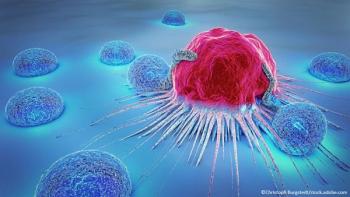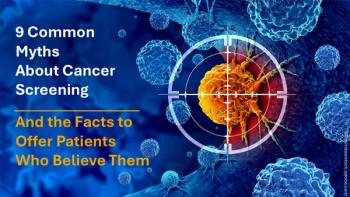
PSAs Predict Long-Term Mortality for Metastatic Prostate Cancer
SAN ANTONIO -- For men with newly diagnosed metastatic prostate cancer treated with androgen deprivation therapy, PSA levels at seven months seem to predict long-term survival or early failure.
SAN ANTONIO, Aug. 25 -- For men with newly diagnosed metastatic prostate cancer treated with androgen deprivation therapy (ADT), PSA levels at seven months seem to predict long-term survival or early failure.
Those whose PSAs fell to below 4 ng/dL while undergoing androgen deprivation therapy had about one-third the mortality risk, of men whose levels were higher, said Maha Hussain, M.D., of the University of Michigan in Ann Arbor, reporting for the Southwestern Oncology Group (SWOG).
"This is the first trial in the setting of new D2 [metastatic] prostate cancer to demonstrate unequivocally the survival advantage associated with absolute PSA value in response to androgen deprivation therapy," Dr. Hussain and colleagues wrote in the Aug. 20 issue of the Journal of Clinical Oncology.
The NIH-supported, phase III study evaluated 1,345 men with metastatic prostate cancer (average age, 70) with a baseline PSA of at least 5 ng/dL. Patients received seven months of androgen deprivation therapy, at which time an absolute PSA was measured. Follow-up was about nine years.
A majority of the men (69%) achieved a PSA level reduction to 4 ng/dL or less at seven months. For nearly half the men (48%), PSA fell to undetectable levels (0.2 ng/dL or less).
Median survival time for men whose PSA remained at or above 4 ng/dL was 13 months, compared with 44 months for those with levels under 4 ng/dL and 75 months for those who achieved undetectable levels.
Compared with men with levels above 4 ng/dl, those with levels below had a significantly lower risk of dying (hazard ratio=0.30; 95% confidence interval=0.24 to 0.38; P<.0001) as did those with undetectable levels (HR=0.17; 95% CI=0.13 to 0.21; P<.001).
Performance status, Gleason sum, bone pain, and baseline PSA were also significantly associated with long-term morality (P<.05). However, the results were adjusted for these four factors.
"The information provided by this survival analysis as a function of PSA value in response to androgen deprivation therapy is the most powerful prognosticator yet, at an individual patient level, using one easily and reproducibly measurable factor," the authors said.
"The results are robust enough to allow the identification of patients who are unlikely to do well with standard androgen deprivation therapy long before developing overt androgen independence, thus providing a window of opportunity to investigate newer therapies," they added.
"The precise factors associated with better survival after ADT in this setting are not well characterized. The observed variability in survival is striking with median overall survivals ranging from 13 to 75 months on the basis of the absolute PSA achieved, thus reflecting the biologic heterogeneity of this disease," the authors said.
Future studies exploring the impact of circulating hormone levels, growth factors, and genetic variability in the synthesis and metabolism of steroid hormones and the insulin-like growth factor may help explain the current study's findings, they said.
Newsletter
Enhance your clinical practice with the Patient Care newsletter, offering the latest evidence-based guidelines, diagnostic insights, and treatment strategies for primary care physicians.

































































































































